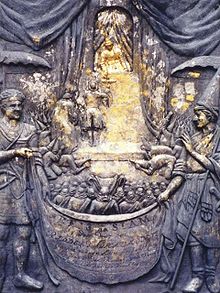Narai
Narai the Great ( Thai : สมเด็จ พระ นารายณ์ มหาราช - Somdet Phra Narai Maharat ; † July 11, 1688 in Ayutthaya ) was King of the Siamese Empire of Ayutthaya from October 26, 1656 until his death on July 11, 1688, succeeding King Prasat Thong and the briefly reigning kings Chai and Suthammaracha .
Live and act
After the death of King Prasat Thong, after some intrigues and palace revolts in which his two predecessors were executed, “in the year 1018 CS , a year of the monkey , on the 8th of the decade, a Thursday, the second day of the waning moon 12th month at 2 o'clock in the afternoon ”(on October 26, 1656) the crown. The Europeans had become aware of the growing economic power of Siam and were hungry for the country's rich mineral resources. Even under his father there had been first attempts at blackmail by the Dutch and the Japanese , who thereby threw themselves out of the race. Narai developed a well-balanced policy of balance between the European powers, which over the centuries was to become a hallmark of the foreign policy of Siam and Thailand. As a result, it secured Thailand's autonomy within its national borders, and colonization - as with the other Southeast Asian states - was always able to fend off Thailand.
Narai knew how to take advantage of trade relations with the Europeans and the country experienced a significant modernization. At first, Siam came closer to the French : in 1662 French missionaries were allowed to settle in Ayutthaya and practice their religion. The French hoped for a conversion of the “unbelievers” and thus a stronger influence on the country. King Narai was more interested in how the French implemented churches and other permanent structures architecturally.
At the beginning of 1664 the Dutch came back and, through a sea blockade, forced Ayutthaya to have a monopoly on the trade in animal skins. A few skirmishes with the Burmese over the northern areas around Chiang Mai did not change the situation: Burma remained master of Siam's north. In the same year Narai Lop Buri made a "secret" capital of the kingdom.
In 1677 Narai commissioned the French engineer Lamar to investigate the isthmus of Kra . One wanted to find out to what extent the construction of a canal ( Kra Canal ) as a connection between the Indian Ocean and the Gulf of Thailand would be possible. Lamar found that the construction of a canal was impracticable with the means at the time.
In 1678 the Greek adventurer Constantine Phaulkon (Faulcon) reached Siam and made a career very quickly, which was due to Narai's friendly attitude towards the Europeans. As Chancellor, Phaulkon made policy for France from behind and tried to push the other powers out as far as possible. In 1680 the French-East Indian trading company was established in Ayutthaya. This called the English on the scene, who tried to increase their influence. However, they were officially asked by Narai to withdraw from Siam.
After years of silent anger, it was getting too much for the non-friendly group. The overthrow of Narai was planned, a serious illness of the king came to the rescue. In Lop Buri he was held under house arrest by his foster brother Phra Phetracha . His adopted son Phra Pia was murdered. Constantine Phaulkon was also tried and executed as a traitor in Lop Buri. In order to eliminate all heirs to the throne, Phetracha also had his brothers, the princes Chao Fa Apa Ithot and Chao Fa Noy, executed. Finally, on July 11, 1688, Narai died without leaving a legitimate heir. The way for Phetracha was clear.
Individual evidence
- ^ Richard D. Cushman: The Royal Chronicles Of Ayutthaya , Bangkok 2000
- ^ Richard D. Cushman, The Royal Chronicles Of Ayutthaya , 232
literature
- WAR Wood : A History of Siam. From the earliest Times to the Year AD 1781. With a supplement dealing with more recent events. Unwin, London 1926.
- Richard D. Cushman: The Royal Chronicles Of Ayutthaya. Edited by David K. Wyatt . The Siam Society, Bangkok 2000, ISBN 974-8298-48-5 (literal translation and direct comparison of 7 chronicles available today , from the founding of Ayutthaya to King Taksin).
- David K. Wyatt: Thailand A Short History. Silkworm Books, Chiang Mai 1984, ISBN 974-7047-44-6
| personal data | |
|---|---|
| SURNAME | Narai |
| ALTERNATIVE NAMES | Somdet Phra Narai Maharat (full name); สมเด็จ พระ นารายณ์ มหาราช (th) |
| BRIEF DESCRIPTION | King of Ayutthaya in Siam |
| DATE OF BIRTH | 17th century |
| DATE OF DEATH | July 11, 1688 |
| Place of death | Ayutthaya |

